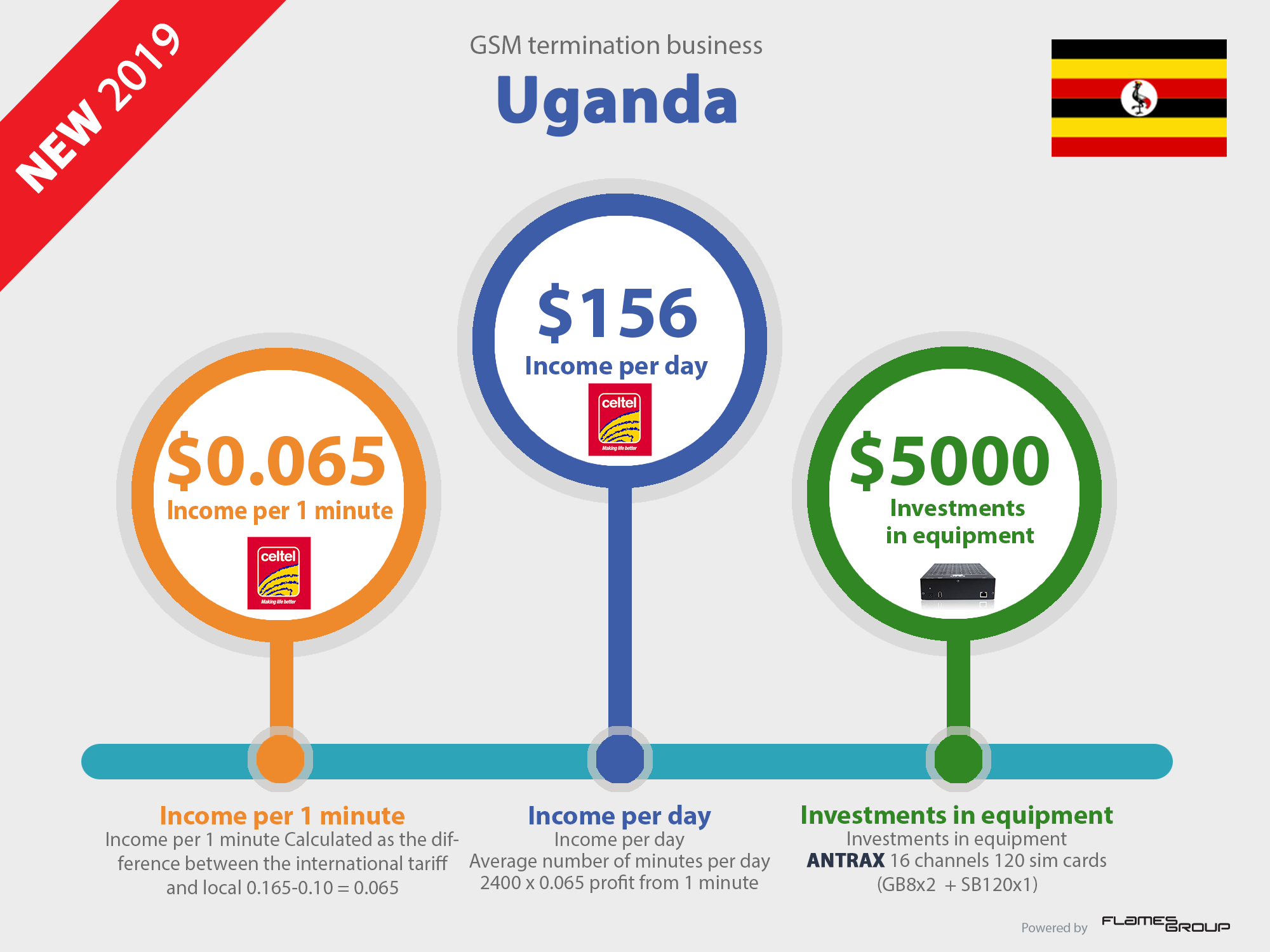We’ve made a review of different articles about Ugandan VoiP business called simboxing.
Below you can find the highlights about Ugandian simboxing:
- SIM boxing is extremely popular in Uganda
- The turnover differs from year to year, but there are huge revenues
- Usually they Do SIM blocking, not detection. Many companies try to beat fraud, but nobody guarantee fully this activity but can not do a lot with it.
- In Top Government roles this activity is covered by officials to earn and then laundry this money
- Even single GSM terminators can do SIM boxing
- Operators claim that this is still hard to get rid absolutely of SIM boxers
- While Uganda will have high rates for international calls, we will have people that do this illegal but profitable business.

Top 3 insights about Simboxing in Uganda by independent.co.ug
Link to article: https://www.independent.co.ug/museveni-buying-shs70bn-gadget-to-monitor-telecoms/3/
- International studies have indicated that network operators lose about 3% of the annual revenue due to fraudulent and illegal services. The biggest operator, MTN, last year suffered a huge decline in profits but still managed to rake in Shs177 billion profit.
- A 3% loss of that to SIMbox operators amounts to about Shs5.5billion. The Communications Fraud Control Association (CFCA), states that telecoms lose over 15 per cent of their interconnection termination revenue through SIM boxing. Some researchers put the total global losses from the underground mobile network industry to be $58 billion in 2011.
- The SIMboxes , apart from the initial capital injection, there are literally no expenses, no taxes at all since it is an underground business. An owner of a SIMbox can earn up to $10,000 dollars a day (Approx.Shs33 million) from just one simbox, those with knowledge on the dark industry say. That is about US$ 3.6 million a year per SIMbox. Operators usually run several and rake in several million dollars. But as simbox operators make these millions, registered operators and government are the major losers.
Top 3 highlights about Simboxing in Uganda by cio.co.ke
Link to article: https://www.cio.co.ke/east-african-regulators-need-to-be-aligned-to-curb-simbox-fraud/
- Simbox fraud in East Africa is rife. Fraudsters are getting away with it—using sophisticated technology.
- Uganda charges an excise duty of $0.09 per minute for incoming international calls while Kenya, Rwanda and South Sudan charge $0.04 per minute. Telecoms analysts say the fraudsters are rerouting traffic meant for Uganda to the other ONA countries where charges are lower, thereby pocketing the $0.05 difference at the expense of the legitimate mobile companies and the Ugandan government. It is estimated that Uganda has lost up to USD 144 million accruing from inbound international telecoms traffic disguised as local traffic. This is a huge amount of revenue for any emerging country to lose.
The Financial Intelligence Authority (FIA), has received reports of suspicious activities, pointing to possible fraud, tax evasion, money laundering and suspected terrorist financing via illegal international traffic, also known as “grey traffic.” In the process the Ugandan government loses 45% of its tax revenue, while the telecommunications companies lose more than 80% of the revenue due to them. - The traffic that goes through official international gateways is instead delivered through Simboxes (racks containing hundreds of local numbers) and received as local traffic. The fraudsters end up paying only an eighth of the money they should have paid to the legitimate voice operators in interconnection fees. The Simbox operators, often disguised as data vending companies, negotiate agreements under which the money is paid to them outside the country and they only pay the local termination fee. It is estimated that these fraudulent operators are terminating as many as four million minutes a month—representing a significant revenue leakage for both the telecommunications industry and the government.
Top 3 highlights about Simboxing in Uganda by allafrica.com
Link to article: https://allafrica.com/stories/201802260042.html
- Apart from the monitoring aspect, insiders say, the technology might also bring the country closer to dealing with a telecom fraud known as voice traffic termination fraud or SIMbox fraud, which costs telecom companies revenue and the government taxes.
- The trade is very lucrative, insiders claim. While telecom companies are always co-owned, revenue and losses shared on top of paying taxes; for simboxes, apart from the initial capital injection, there are literally no expenses, no taxes at all since it is an underground business.
An owner of a simbox can earn up to $10,000 dollars a day from just one simbox, those knowledgeable about the industry claim. That is about $ 350,000 a year. And with multiple simboxes, the figure goes up to millions of dollars. - But as simbox operators make these billions, registered operators and government are the major losers. Simboxing hurts telecoms business of international call termination, which is big business with agreements between telecom companies in millions of dollars. For instance, for a person using Vodafone to call an MTN subscriber in Uganda, Vodafone pays part of what it charges the caller to MTN.
Top 3 highlights about Simboxing in Uganda by IGIHE.com
Link to article: http://en.igihe.com/news/rib-arrests-ugandan-national-over-sim-box-fraud.html
- SIM Box fraud is a setup in which fraudsters install SIM boxes with multiple low-cost prepaid SIM cards. The fraudster can then terminate international calls through local phone numbers in the respective country to make it appear as if it is a local call.
- For instance, if an international call is usually at Rwf50 per minute, the SIM Box fraudsters can connect it at Rwf20 and receive a kick-back from the carriers, making an international call register as a local.
- MTN Rwanda reports that the SIM-Boxing fraud has so far ripped it of millions of money while the telecom and RURA again lost huge amounts last year.
Top 3 highlights about Simboxing in Uganda by theeastafrican.co.ke
Link to article: https://www.theeastafrican.co.ke/business/Simbox-fraud-hits-East-Africa-s-one-network-area/2560-3055670-swygvvz/index.html
- “While we take every care to ensure that all cases are immediately identified and work with the CA to resolve any cases, individuals are still able to purchase Sim cards from the open market, register them as required by law and put them to whatever use they want,” said Stephen Chege, Safaricom director of corporate affairs.
- Operators said it had become difficult to track down these players because of limited information available on trunking patterns in the regulator’s database.
- “Mobile operators need to implement stiffer measures to monitor Sim registration and track Sim distributions through dealers such that acquisition of multiple Simcards on a single network becomes difficult for potential illegal users,”
Interested? Request your free consultation.
Read our the most popular posts about GSM termination business:
What is GSM termination: a profitable business, fraud, or the good mission?
How to start profitable VoIP GSM termination business?
Choosing Anti SIM Blocking Solution for Call Termination
GSM termination security: calmness for business owner and stable income
Was this information useful? Share the business idea with your friends!


 (3 votes, average: 4.67 out of 5)
(3 votes, average: 4.67 out of 5)